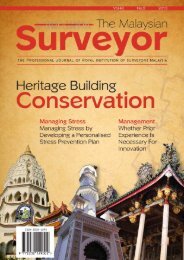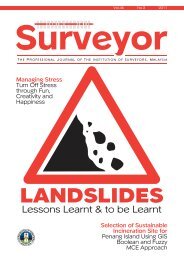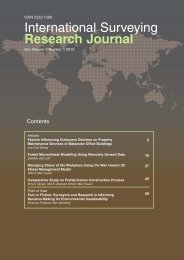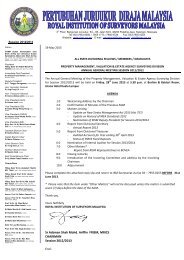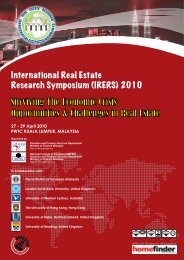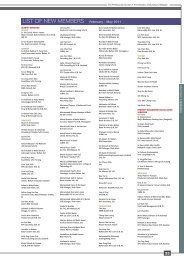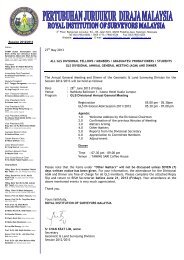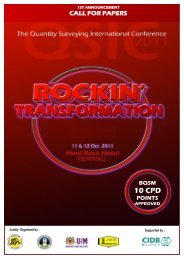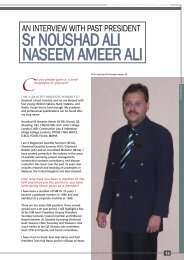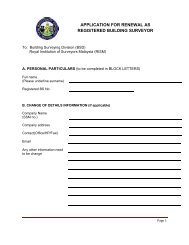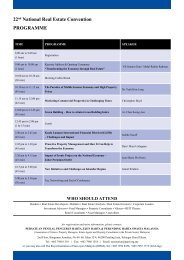Full 46.1 - Royal Institution of Surveyors Malaysia
Full 46.1 - Royal Institution of Surveyors Malaysia
Full 46.1 - Royal Institution of Surveyors Malaysia
Create successful ePaper yourself
Turn your PDF publications into a flip-book with our unique Google optimized e-Paper software.
THE MALAYSIAN SURVEYOR | Vol.46 | No.1 | 2011<br />
serious struggles. The fact is life adversity is<br />
associated with higher global distress that leads<br />
to functional impairment and lower life<br />
satisfaction. For those who do have a history <strong>of</strong><br />
lifetime adversity <strong>of</strong> some sort and have learnt<br />
the skills <strong>of</strong> handling situations, they do appear<br />
to be less negatively affected by recent adverse<br />
events than others. In fact, the experiences<br />
make them stronger and more resilient.<br />
The question in hand is how to respond to<br />
adverse life experiences? It is all about<br />
emotional resilience. Just like a broken bone<br />
becomes stronger than before once it is healed,<br />
we can be matured and stronger once we<br />
reach the other side <strong>of</strong> a difficult life event.<br />
Resilience has its benefits for daily life as well<br />
as for the rare major disasters that come in<br />
between. So what’s the difference between the<br />
strong and the weak? Many <strong>of</strong> us do have the<br />
emotional and physical resilience that were<br />
accumulated over the years as we grow older,<br />
thus becoming less upset by changes and<br />
surprises. The fact also remains that emotional<br />
resilience is related to some factors that are<br />
beyond our control, such as age, gender and<br />
exposure to trauma. However, resilience can be<br />
developed with a little effort. With some basic<br />
skills, we can become more resilient, even if we<br />
are naturally more sensitive to life’s difficulties.<br />
Traits <strong>of</strong> Emotional Resilience<br />
While many may not realise that resilience is an<br />
inbuilt quality, the varying degrees <strong>of</strong> how well<br />
a person is able to handle stress makes up the<br />
difference between those who are resilient and<br />
those who are not or less resilient. The<br />
following are some <strong>of</strong> the main characteristics<br />
<strong>of</strong> a resilient person:<br />
• Positive Self-talk: People who are<br />
resilient tend to view life’s difficulties as<br />
challenges and respond accordingly with<br />
the right thought and action, rather than<br />
with fear, self-pity, blame or acting with a<br />
“losing victim” mentality. While life can be<br />
very challenging, an important step in<br />
becoming more resilient is to develop<br />
positive self-talk by accepting the fact that it<br />
is true life is out there for everybody who is<br />
strong and wise.<br />
• Acceptance: For many <strong>of</strong> us, the life we<br />
have is not the life we expect but by<br />
accepting the reality it is what makes us<br />
move forward although it is such a difficult<br />
thing to do. More <strong>of</strong>ten, denial, anger,<br />
bargaining and depression are adopted as<br />
steps <strong>of</strong> the grieving process when the<br />
unexpected comes by and then, followed<br />
by acceptance. However, if we stay in a<br />
place where we cannot accept what has<br />
“We were all taught to seek<br />
forgiveness for all our wrong doings<br />
as it is not a sign <strong>of</strong> weakness but<br />
mere strength as forgiveness is not<br />
for the other person but for the one<br />
who forgives.”<br />
happened to us, we are somewhat<br />
obsessed with denial and dwell on the<br />
injustice <strong>of</strong> it, and all that bring about<br />
additional stress. Accepting who we are<br />
and where we come from, enables us to<br />
take stock <strong>of</strong> all that we have and feel<br />
grateful for them, and move forward with<br />
our lives as there are those bottom billion<br />
out there who are more unfortunate than<br />
us. In fact, denial can hamper our ability to<br />
cope with the facts <strong>of</strong> life in a healthy way,<br />
and can rob us <strong>of</strong> the gifts and privileges<br />
we have thus far.<br />
• Emotional Awareness: Learn the<br />
skills to understand your own feelings and<br />
why it crops up in the first place. You may<br />
sometimes feel overwhelmed with your<br />
emotions, thus making you frighten <strong>of</strong><br />
the situation and end up being static<br />
and motionless. Knowing what<br />
makes you feel upset can provide<br />
valuable information about what<br />
needs changing in life. Take<br />
note <strong>of</strong> what happens and<br />
explore your inner world and<br />
come up with an action plan.<br />
Gathering more accurate<br />
recollections <strong>of</strong> feelings allow<br />
us to capture emotional ups<br />
and downs.<br />
• Internal Locus <strong>of</strong><br />
Control: Resilient people<br />
believe that they are in<br />
control <strong>of</strong> their lives. While<br />
you can’t control your<br />
circumstances, you can<br />
develop an internal locus <strong>of</strong><br />
control to respond to those<br />
circumstances. This means<br />
believing that you are in control<br />
<strong>of</strong> your own life and at the same<br />
time, focusing on the outside<br />
forces. This can bring about a<br />
big difference in your<br />
attitude in the course <strong>of</strong><br />
your life.<br />
• Optimism: Optimists see<br />
the positives in most<br />
46



